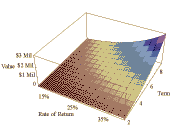The Tax Deferred Exchange
 Real estate offers ways to defer taxes not available to investors in securities. While it may appear that deferring taxes is universally preferred, there are times when it may be only marginally beneficial. At such times it is necessary to make a very precise calculation of the benefits and costs of tax deferral. The Fundamental Law of Taxation reminds us that it is always cheaper to pay taxes than lose money. When the costs (extra fees, delays, a hasty or inopportune acquisition) of exchanging exceed the benefits, the sale and repurchase strategy dominates.
Real estate offers ways to defer taxes not available to investors in securities. While it may appear that deferring taxes is universally preferred, there are times when it may be only marginally beneficial. At such times it is necessary to make a very precise calculation of the benefits and costs of tax deferral. The Fundamental Law of Taxation reminds us that it is always cheaper to pay taxes than lose money. When the costs (extra fees, delays, a hasty or inopportune acquisition) of exchanging exceed the benefits, the sale and repurchase strategy dominates.
An investor is well-advised to proceed cautiously when considering an exchange. The calculations may be made with information readily available and require, among other things, considering the carryover tax basis of the acquired property, the expected return from the property and the projected length of holding period in the new acquisition.
The graphic at the left maps the various values of tax deferral as expected rate of return and holding period term change. In the instant case (in which assumptions have been made that are not detailed here) it is clear that only longer holding periods and higher return projections strongly recommend this particular exchange.
The point is not to make a general statement about the advisability or efficacy of any particular tax-driven strategy. Rather it is to urge careful consideration of the alternatives to determine which maximizes the investor's terminal wealth.
